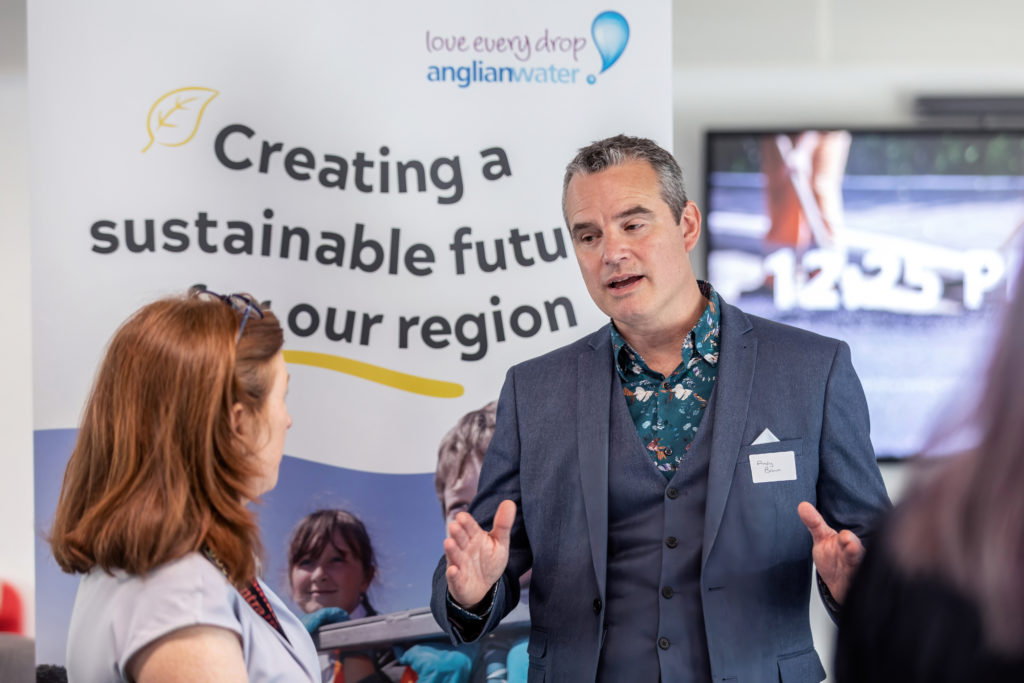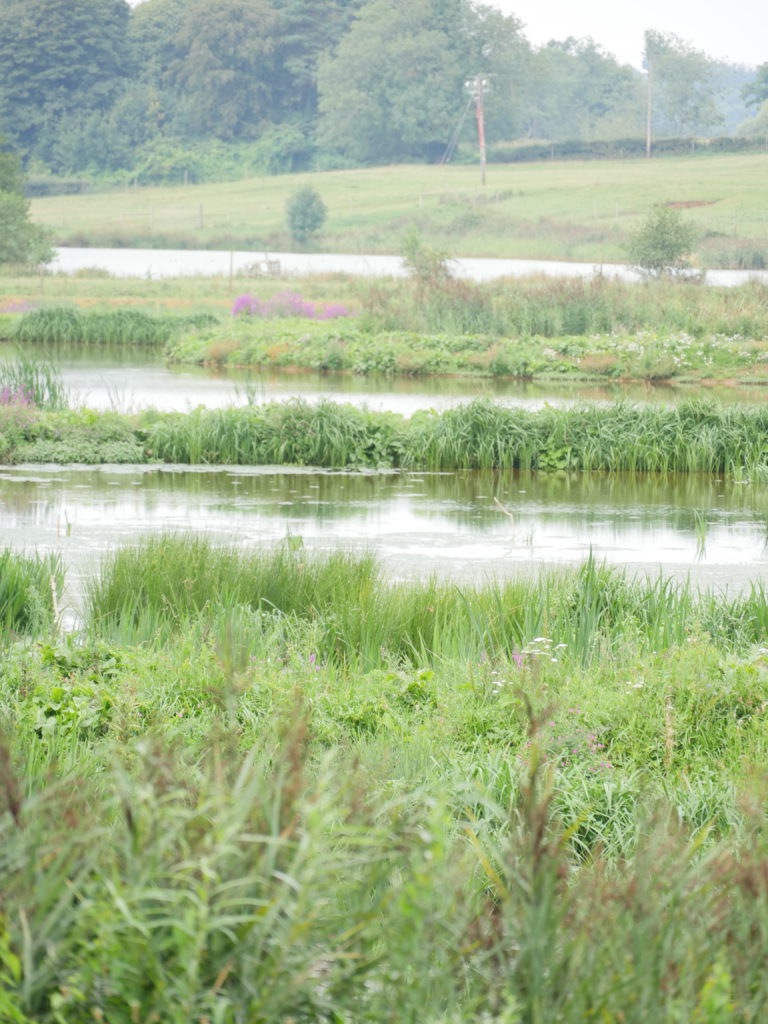Amid the complex and pressing crises facing our world, an inescapable truth has become clear: business as usual will not solve today’s biggest challenges. To overcome our collective crises and contribute to the wellbeing of people and planet, we need to reorient our business models around purpose.
We spoke with Andy Brown, Group Chief Sustainability Officer of Anglian Water, a water company that operates in the East of England, about how this company changed its model to set purpose at the heart of its constitution and is demonstrating that it works.

What inspired your founders to start advocating for the Wellbeing Economy?
Anglian Water has always believed that we should be a purpose-led business contributing to a Wellbeing Economy. But it was the realization of the impacts of the changing climate and the growing population that crystalized the fact that we could not continue with business as usual.
The year 2010 saw us start to make real changes, as we brought our sustainability strategy and our business plan together to create a single sustainable business plan based around 10 environmental and social outcomes that we had co-created with our customers.
The next step came in 2019 when we created our purpose: “to bring environmental and social prosperity to the region we serve.” This was not a statement to put up behind reception in our head office; this was built into our constitution as we amended our Articles of Association.
What do you consider to be your biggest success as an advocate and professional in this space? Can you share any stories of the impact your work has had that have surprised you?
When we changed our Articles of Association to embed our purpose, our board also stated that they wanted to be held accountable to a set of responsible business principles. I was tasked with reviewing and recommending these, but nothing seemed to really get to the heart of what it meant to be a purpose-driven organization and deliver against the Wellbeing Economy. So, we approached the British Standards Institution about creating something new. What followed was the development of a partnership and the creation of a new Publicly Available Specification, PAS 808:2022 Purpose-driven organizations. Worldviews, principles and behaviours for delivering sustainability.
After two years of development, input from a brilliant cross-sector steering group, comments from a public consultation, and great guidance from our Technical Author, Dr. Victoria Hurth, it was launched in 2022.
Since that time, I have been involved in promoting it throughout the UK and have established a community of practice that includes more than 100 individuals from organizations large and small. I have been asked to speak about it to sustainability consultants who want to use it to support their clients, to banks who are considering how it can improve their approach, food producers who think it can demonstrate their sustainability credentials, and by a university that is using it as the framework for their new social purpose. What surprised me was, despite the complexity of the subject, the immediate and widespread interest in the framework.

How do you feel that shifting to a Wellbeing Economy will help make the world better?
The challenges that we face from a changing climate, a biodiversity crisis, and population growth are too great for us to meet by maintaining the status quo. So, we have to reposition ourselves and our organizations to understand that to survive and thrive we have to maintain and enhance the wellbeing of the environment and the communities that rely on it. Making a fair return for our activities should not be incompatible with that, but our meta-purpose must be to make a positive difference in the world in which we live.
But for this meta-purpose to be achieved, all organizations need to get to this point of realization. I guess I see this shift in business model and a move to a Wellbeing Economy as fundamental in addressing and reversing the challenges that the planet and all of us who live on it face today.
What are some of the challenges you typically face in advocating for the Wellbeing Economy?
We are trying to change a well-established norm and that is always a challenge, but the evidence to drive change simply gets clearer year over year. As a business that plans for the longer term, with a Strategic Direction Statement and a Long-Term Delivery Strategy that both look 25 years into the future, it is perhaps easier for us to understand the risks that we face and the inescapable truth that our business model needed to change. For others that are focused purely on the short term, this can often be much harder to grasp.
The decision to focus on purpose and the delivery of a Wellbeing Economy has to be made in the boardroom, and so the role of peer advocacy is critical; CEOs, CFOs, and CSOs in organizations that have made the change must stand up and be counted. But increasing focus from the investment community and frameworks such as the Task Force on Climate-related Financial Disclosures, the Taskforce on Nature-related Financial Disclosures, and the Sustainable Finance Disclosure Regulation are also raising the profile of these issues at the board.
Are there any upcoming initiatives or projects related to your work/the Wellbeing Economy you’d like to share?
As an industry, there are many exciting technical developments, including the movement from traditionally-built treatment solutions to nature-based solutions and the rapid scaling up, the creation of digital twins in ecological catchments to help us make better decisions, great strides in the development of real-time monitoring and sharing of data, the creation of water smart communities, and even the role of sewage in creating sustainable aviation fuel. For me, though, it still comes back to the basics of changing the business model and demonstrating that it works.
We have been reviewing ourselves against PAS 808 and this has just been independently assessed by BSI, and we will share this assessment in 2024. Even though we had changed our Articles of Association, built our culture and values on this purpose, developed a six capitals approach to our investment decision-making, and changed our reward policies to support our purpose, we still found further areas for improvement. We want to share this so that other organizations can see how this can lead to developments and improvements in how you operate.
What can people do to help spread the word about or take action toward transitioning to the Wellbeing Economy? How can they support your mission?
Although PAS 808 was produced in the UK, it’s applicable to any organization anywhere in the world. So, I would say start with downloading and reading that; it was such an important subject that we agreed with BSI that it should be free to access. It doesn’t matter where you and your organization are on this journey, it can be used as a framework to establish your purpose, challenge and evolve your current purpose, or evaluate the success of your purpose and assess how you are displaying the behaviours of a purpose-driven organization and if that is supporting the meta-purpose of the Wellbeing Economy.
Then I would say join the “PAS 808: purpose-driven organisations” community of practice on LinkedIn, where you can share your thoughts and hear the experiences of others who are trying to embed purpose and work toward a Wellbeing Economy.
And of course, we can all use a bit of moral support, and this group can give that too.
This story was featured in the Make The World Better Magazine:


